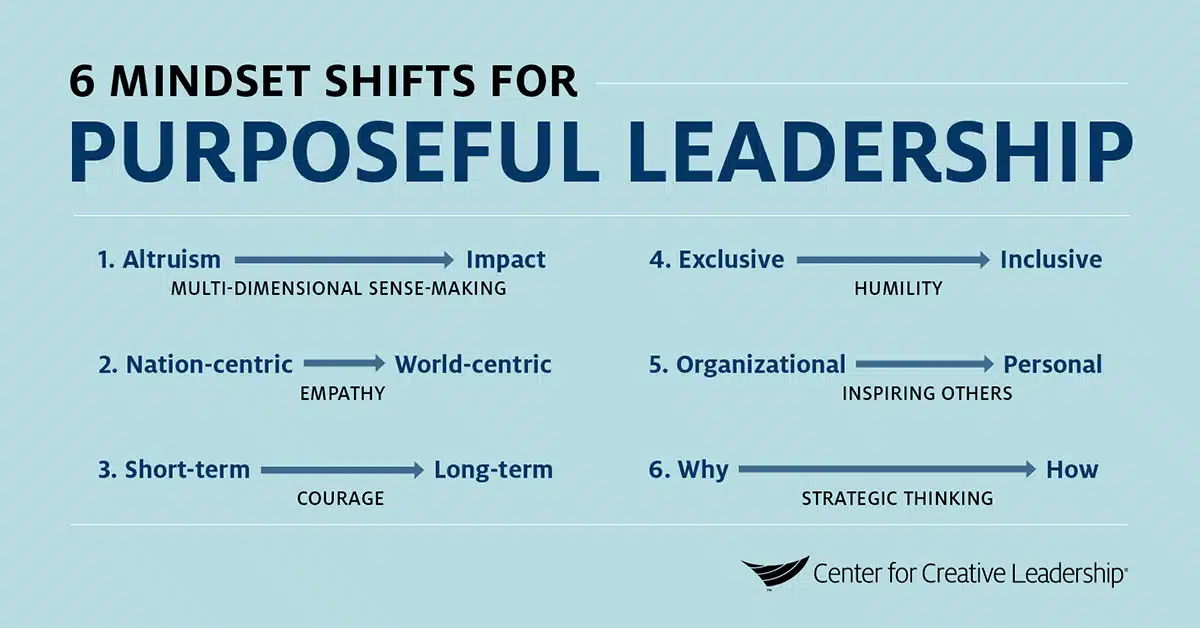As enterprise continue to emerge from the shadows of the extended pandemic, leadership teams will need to nurture organizational purpose, making it more central in culture, business strategy, and talent engagement.
We conducted in-depth interviews with 20 C-suite leaders and board directors across Asia to uncover the shifts organizations must make as they evolve into more socially accepted and financially better-off versions of themselves in the future.
What Is Purposeful Leadership?
Management teams aspiring to make their organizations future-fluent must practice purposeful leadership. They must have clarity about who the organization as a collective is, what purpose it serves, and how the business impacts the environment, society, community, customers, employees, and other stakeholders.
There is evidence to suggest that purpose-driven companies guided by purposeful leadership are characterized not only by their fulfillment of societal needs but also by highly motivated and satisfied employees.
Authentic purpose enables employees to appreciate the connection between their work and the direction of the organization. Employees therefore are more motivated, lift their performance, and increase discretionary effort, thereby contributing to financial gains.
How to Distinguish an Organization’s Purpose from Its Vision & Mission
At the most fundamental level, the purpose of an organization is to engage in ethical, sustainable, and profitable activity to create “value” to society. Purpose connects a business entity with all stakeholders, including shareholders, employees, customers, suppliers, vendors, creditors, and communities.
An organization’s vision encompasses the goals it hopes to achieve, and its mission summarizes how it plans to achieve those goals. Purpose often addresses the question: Why does the organization exist, and how will it stay relevant in the long term?
While most organizations have a set of values, and a mission and vision that define its business aspirations and philosophy — and these often overlap with the key objective that purpose fulfills — there is still a need to invest energy to get to the core of the company’s existence and articulate its purpose.
Turning the Spotlight on Corporate Purpose & Purposeful Leadership
The recent pandemic that has plunged the world into social, environmental, and economic challenges has played a key role in turning the spotlight on corporate purpose and purposeful leadership. The scale of the pandemic has shaken up a lot of organizations that did not think they were vulnerable to socioeconomic challenges. The last 2 years have also helped people pause and reflect on their personal and professional priorities.
The recent disruption has awoken boards and leadership teams to the reality of the need to lean toward stakeholder capitalism rather than shareholder capitalism for long-term financial, social, and talent sustainability.
Societies are more aware and more demanding of businesses to balance commercial and social sustainability. Communities are holding organizations more accountable for their actions. People do not want a transactional relationship with organizations that are only in the business of making money; they are looking for more meaning in their work.
Investors are more supportive of organizations that play a more balanced role in the social, economic, and environmental space. Even leaders are more reflective of the alignment between their personal values and the organization’s purpose.
Organizations therefore must look deep within and identify, communicate, and live their purpose authentically. Purposeful leadership is needed now, more than ever before.
Mindset Shifts Needed for Purposeful Leadership
6 Must-Have Traits for Purpose-Led Leadership
Our interviews with C-suite leaders and board directors across Asia have uncovered 6 mindset shifts organizations must make as they prepare themselves for a future where purpose will play a key role in their business success, social acceptability, and talent attractiveness.
1. Altruism to Impact.
Purpose-led companies successfully balance social value and economic value generation.
This shift requires the purposeful leadership skill of multi-dimensional sensemaking: To think and act on multiple planes — to quickly scan potential opportunities, risks, and stakeholder expectations and deal with new world situations.
2. Nation-Centric to World-Centric.
Organizations must solve for global issues, but not in a rigid way, tweaking global initiatives to suit local challenges and cultures.
This shift requires the purposeful leadership skill of influence: The power and the ability to personally affect key stakeholder actions, decisions, and opinions in a matrixed, multi-geography environment.
3. Short-Term to Long-Term.
The purposeful leadership team must navigate the paradox of short-term impact and long-term benefits, with purpose being the guiding light.
This shift requires the purposeful leadership skill of courage: The ability to take appropriate action steps, even in the face of adversity and pressures.
4. Exclusive to Inclusive.
Inclusive growth requires an ecosystem approach, focusing on the wellbeing of employees, customers, suppliers, communities, and the environment.
This shift requires the purposeful leadership skill of humility: Recognition and acceptance of reality through self-awareness and open-mindedness. Humble leaders have a realistic sense of their own capabilities in relation to others and the situation at hand.
5. Organizational to Personal.
For strong alignment, leaders must believe in the power of purpose, cultivate individual purpose, and ensure authenticity.
This shift requires the purposeful leadership skill of inspiring others: Enhancing the potential of people in a way that works for them and encourages them to push themselves, achieve more, reach their potential, or embrace a cause.
6. Why to How.
Organizations must seek answers to “how,” which involves action framework, practices, communication strategy, and alignment of purpose and culture.
This shift requires the purposeful leadership skill of strategic thinking: The ability to understand an organization’s long-term strategy and come up with effective plans in line with the organization’s business objectives within the local/regional/global socio-economic-environmental context.
Learn more about the 6 mindset shifts required for purposeful leadership by downloading our white paper below.
Download White Paper
Download this white paper to discover the shifts and skillsets required for purposeful leadership, uncovered through in-depth interviews with 20 C-suite leaders and board directors across Asia.











